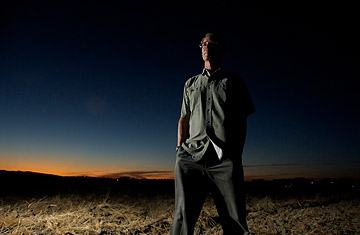
Environmentalists tend to focus on the past, on what was and is lost, or soon will be. There is a distrust of the future, a questioning of what is passed off as progress that can be spiritually deadening, even though it may be tactically astute. Life is lessened if the imagination fails to offer futures we can envision better than any past. And it is on the way to them that you will find Kim Stanley Robinson, perhaps the foremost practitioner of literary utopias.
Robinson, 56, is a Californian, an intellectual, a child rearer, an activist, a deep believer in the value of science ("Science is — or should be — the greenest force of all.") He is also one of the most accomplished and popular writers working in science fiction today. In a genre full of environmental warnings, Robinson's gift is a vision that uses the environment and its complexity as the focus of all that happens, rather than merely as grim set dressing or allegorical overlay. And that vision is optimistic about what could, with sufficient will, be brought about. He sees creating utopias as a technical challenge to his craft — they're hard to do convincingly and interestingly. But he also sees them as an empty ecological niche in the imagination; if only to maximise cultural biodiversity, he wants that niche filled.
His breakthrough was a series of three award-winning novels published in the 1990s — Red Mars, Green Mars and Blue Mars — that trace the history of our neighboring planet from its first settlement through a complex story of war, revolution and engineered transformation into something rich and human. More recently, he has been writing stories constrained to a tighter orbit — that of the Washington beltway — where spooks, scientific bureaucrats and Senate staffers try to cope with climate Armageddon, unrequited love, child-care arrangements and the occasional mystical tiger.
It is fashionable to say that science fiction is not really about things to come but about things that are, a projection of today's realities into a future constructed to show them off to their greatest effect. You can certainly read the Mars books as a story of taking responsibility for a planet's reshaping that applies right here right now on earth. But at the same time they are always books about a real Mars waiting in the future, its rocks and ice and canyons and craters relished in their toe-stubbing there-ness. Settings, whether as alien as Mars or as familiar as Washington's Rock Creek Park, are one of the foundations of Robinson's writing; the realism with which he treats the changes he imagines for them is fundamental to making his stories of progress convincing and compelling.
The other foundation is work. No other writer I know can capture so well the hum of joy that goes with working very hard on something you care about. His communication of that experience is itself a work of great creative skill; but its power comes from an authentic sense that it is grounded in just what it describes.
Utopia, Robinson says, is a kind of history, and the experience of utopia is that of making such history: of working, believing, fighting, accepting and — before all and during all — imagining. And he shows what that could mean for us by showing us what it means for him.
Oliver Morton is chief news and features editor of Nature, and the author of Eating the Sun: How Plants Power the Planet